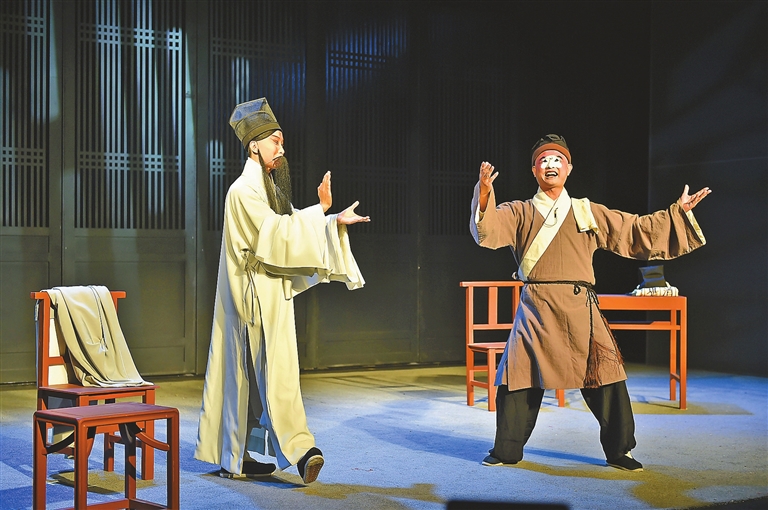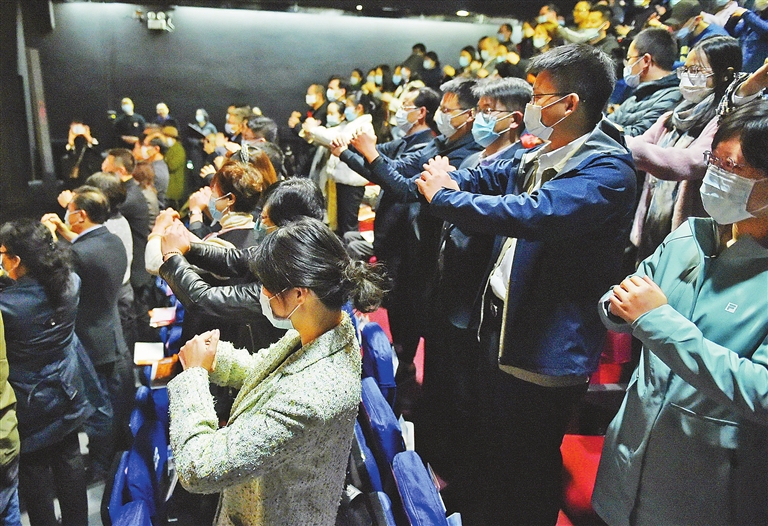

MODERNITY need not be the enemy of tradition. In some ways it may even enhance it. Traditional works of literature, for instance, can be better presented by modern printing techniques. Likewise with stage plays. While some often lament that ancient Chinese art forms are under threat in the face of contemporary entertainment, there is an unmistakable surge in the popularity of ancient art among younger audiences attracted to the intimacy of small theaters. Star Theater, a small theater in Beijing with three performance spaces, each with a capacity of about 200 seats, is dedicated to presenting traditional Chinese operas. It hosts an annual Xiqu Opera Black Box Festival from Oct. 21 to Dec. 20. Xiqu means local opera. This year the festival focuses on Beijing opera. Beijing opera, or Jingju, has a history of more than 200 years and was recognized as an Intangible Cultural Heritage of Humanity by UNESCO in 2010. It brings together art forms such as singing, dancing, martial arts and acrobatics. This year, 16 traditional Chinese opera productions are being staged during the festival, including seven Beijing opera works. There will be productions of other genres, such as Kunqu opera, Pingju opera, Cantonese opera and Chuanju opera as well. Forums, exhibitions and programs for children will also be offered during the festival. Among them, the Independent Interaction on Contemporary Art Exhibition, which brings together 60 works from nine Chinese artists focusing on Beijing opera, will be held at the Star Theater from Nov. 14 to Dec. 31. According to Zhou Long, artistic director of the festival, the event, since its birth in 2014, has attracted more than 100,000 attendees and showcased over 20 kinds of traditional Chinese opera. “Looking back upon Beijing opera’s history, you can tell that it’s something that keeps on moving forward and being renovated by pioneers,” Zhou says. “It keeps changing thanks to the older generation of Beijing opera masters. Contemporary audiences, especially younger people who are new to Beijing opera, may be attracted to shows in small theaters, which are easy to understand, modern and full of fresh ideas.” A 90-minute Beijing opera production, titled “A Straw-Cloaked Life in Mist and Rain,” opened the festival with two shows on Oct. 21 and 22. The play, about Chinese poet Su Shi (1037-1101), also named Su Dongpo, of the Song Dynasty (960-1279), is directed by Bai Ailian from the Jingju Theater Company of Beijing. “There are no Beijing opera scripts about Su Dongpo and the poet has never been portrayed by this art form. I wanted to give it a try,” says Bai, who was born and raised in the Tibet Autonomous Region, and graduated in literary-and-arts-program directing from the Communication University of China. Born into a family of scholars, Su became famous at the age of 19, when he and his younger brother both scored exceptionally well in the imperial exam for aspiring government officials. Apart from that, Su also won further fame and admiration for his poetry, essays and calligraphy. Due to political conflicts between various groups, Su was later banished from the royal court to Huangzhou, now Huanggang in Hubei Province, where he was assigned a low government post. But his life in exile was not wasted, as he drew inspiration from the area and created some of his most famous artistic works. According to Bai, one of the best parts of staging Beijing opera performances at small theaters is that “the small space allows directors, scriptwriters and actors to experiment with ideas that may not be suitable for big theaters.” There are some fictional scenes in the play, such as one where Su meets both an older and a younger version of himself in a dream. “I want to show how Su goes through struggles in his life and how he deals with them, which may resonate with today’s audiences,” the director says. The cast of the play includes veteran Beijing opera actor Jiao Jingge, a teacher at the National Academy of Chinese Theatre Arts, and his students, including Chen Zhe, Zhao Jia and Dong Jianhua. Younger audience members relish such inspiring performances in small theaters. One of them, Ling Xiaomin, who watched the opening performance of the play about Su on the opening night of the Xiqu Opera Black Box Festival on Oct. 21, says he prefers to watch performances in small locations. “I can still recall the first time that I watched a traditional Chinese opera performance at a small theater a year ago. The audience sat so close to the stage that I could even hear the actors breathing,” he said. “Beijing opera shows in small theaters are rooted deeply in the old art form, but the way the stories are told is quite different and interesting to me,” Ling says. Lower ticket prices are also appealing, he adds. Other highlights of this year’s festival include “Lady Macbeth,” a tale centered around one of Shakespeare’s most infamous female characters by a Dianju opera troupe from Yuxi, Yunnan Province; “Two Belles in Love,” a Kunqu opera work by the Northern Kunqu Opera Theater; and a one-man show “Chu Yun” by China Pingju Opera Troupe, which combines Pingju opera, physical theater and puppets. (China Daily) | 
